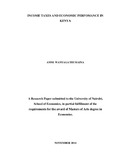| dc.description.abstract | Income tax revenue has been increasing in recent years at a higher proportion than the
other taxes in Kenya making it an important factor in economic decision-making. This
paper presents empirical evidence on the relationship between income tax and
economic performance in Kenya. The paper employed an endogenous growth model
to study the relationship between income tax and economic performance in Kenya for
the period 1970 to 2012. Other variables included for control are consumption tax,
foreign trade, government consumption, and population growth rate. Regression
model was estimated using OLS and VECM. Both OLS model and VECM revealed a
negative relationship between income tax and economic performance but this
relationship was not significant. Consumption tax, foreign trade, and population
growth rate do not significantly influence the economic performance. Government
consumption positively influences performance of the economy. This paper advocates
for increase in efficiency of tax collection. The government should spend the revenue
collected on public investment such as infrastructure to increase productivity. This
will ensure improved economic performance. | en_US |

